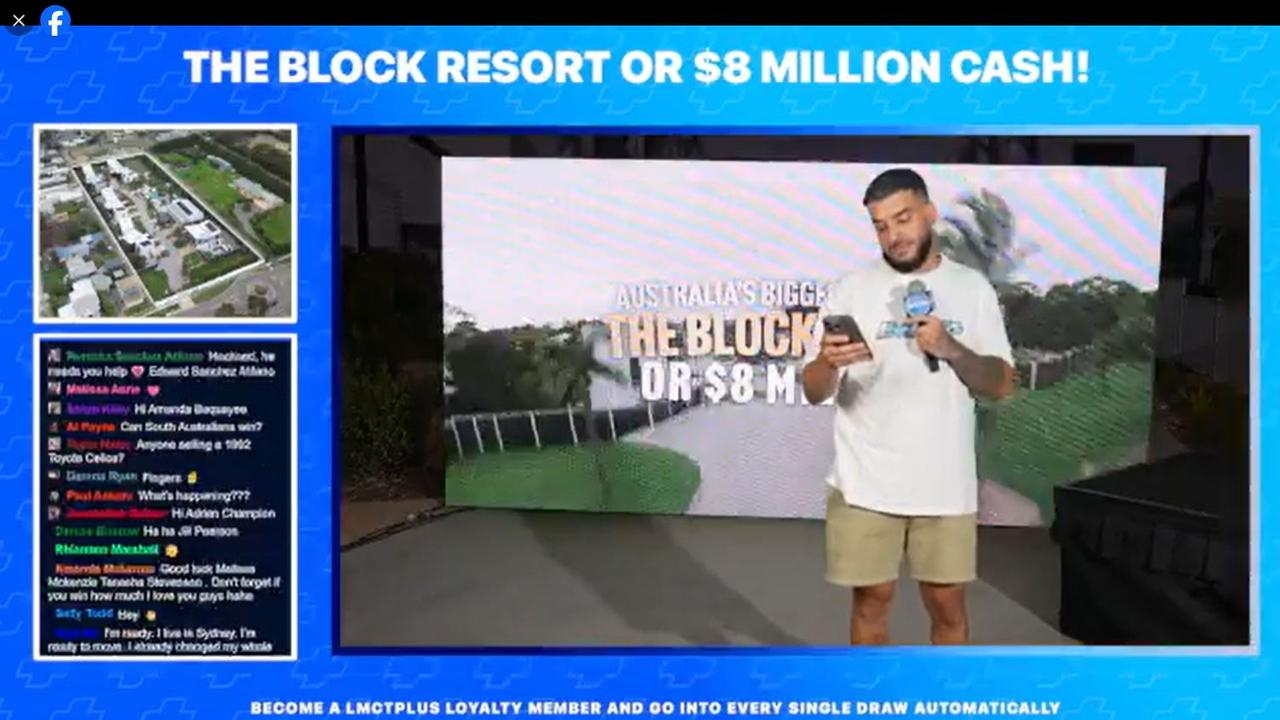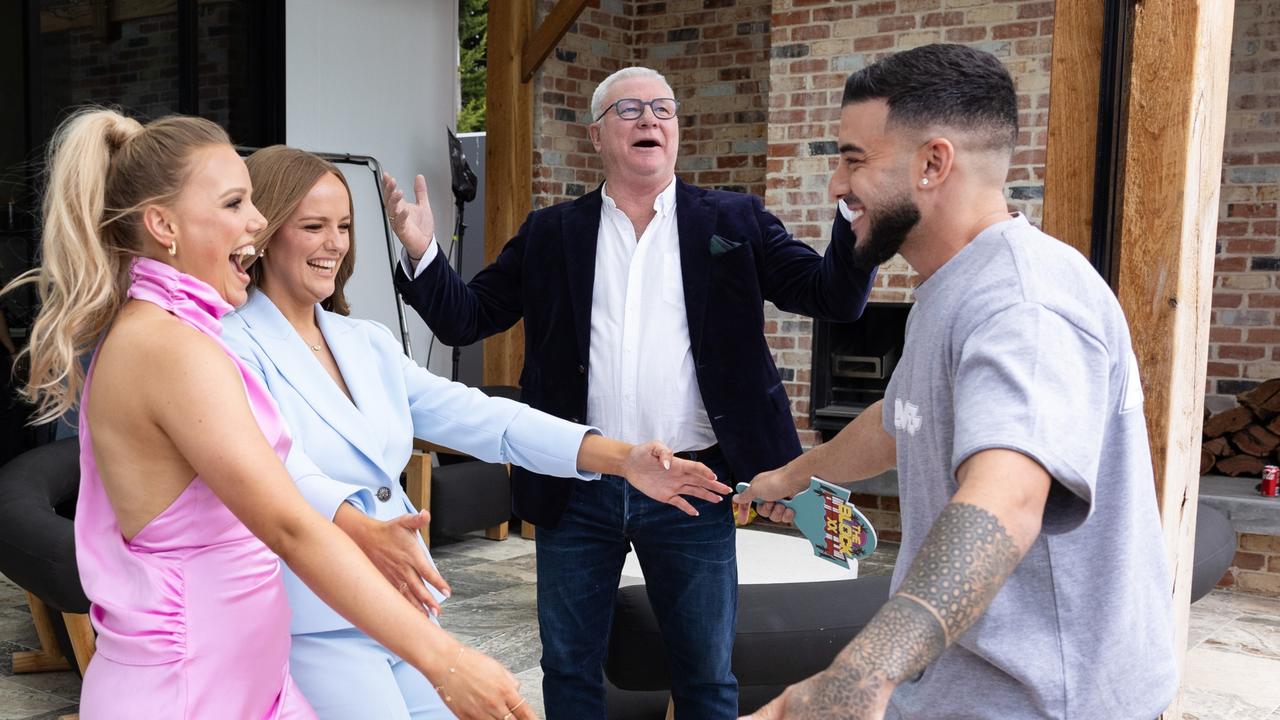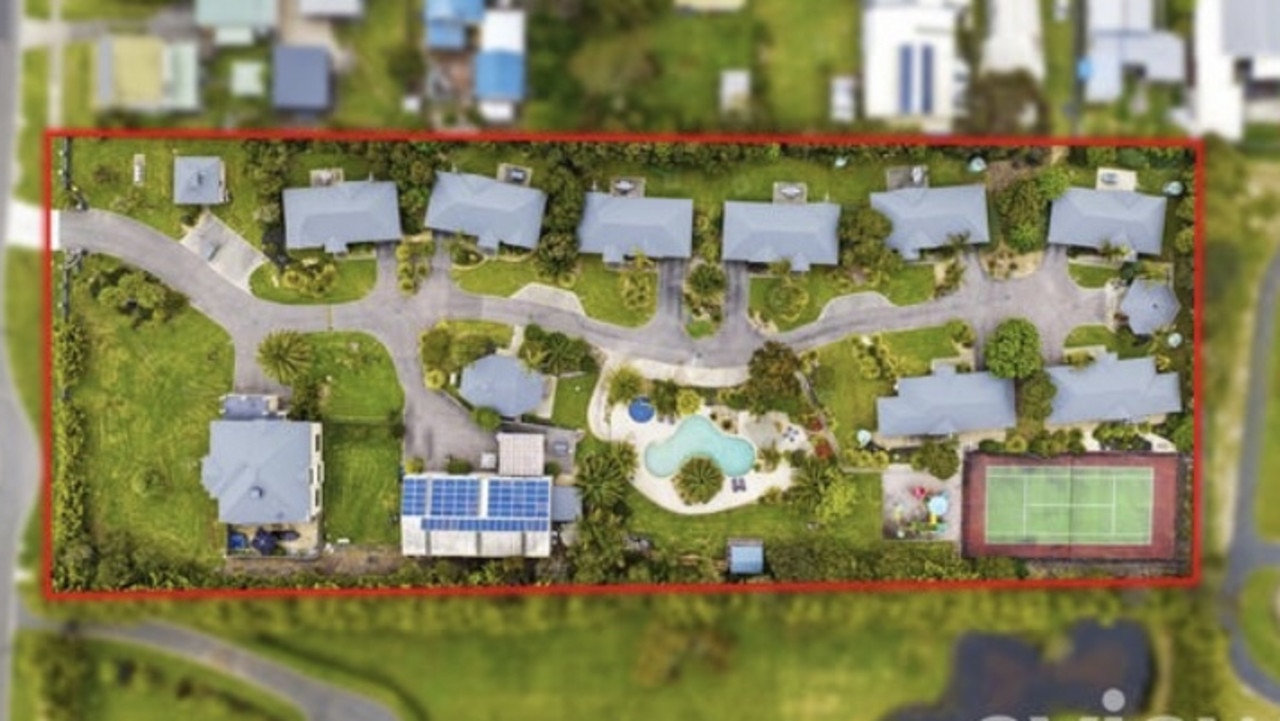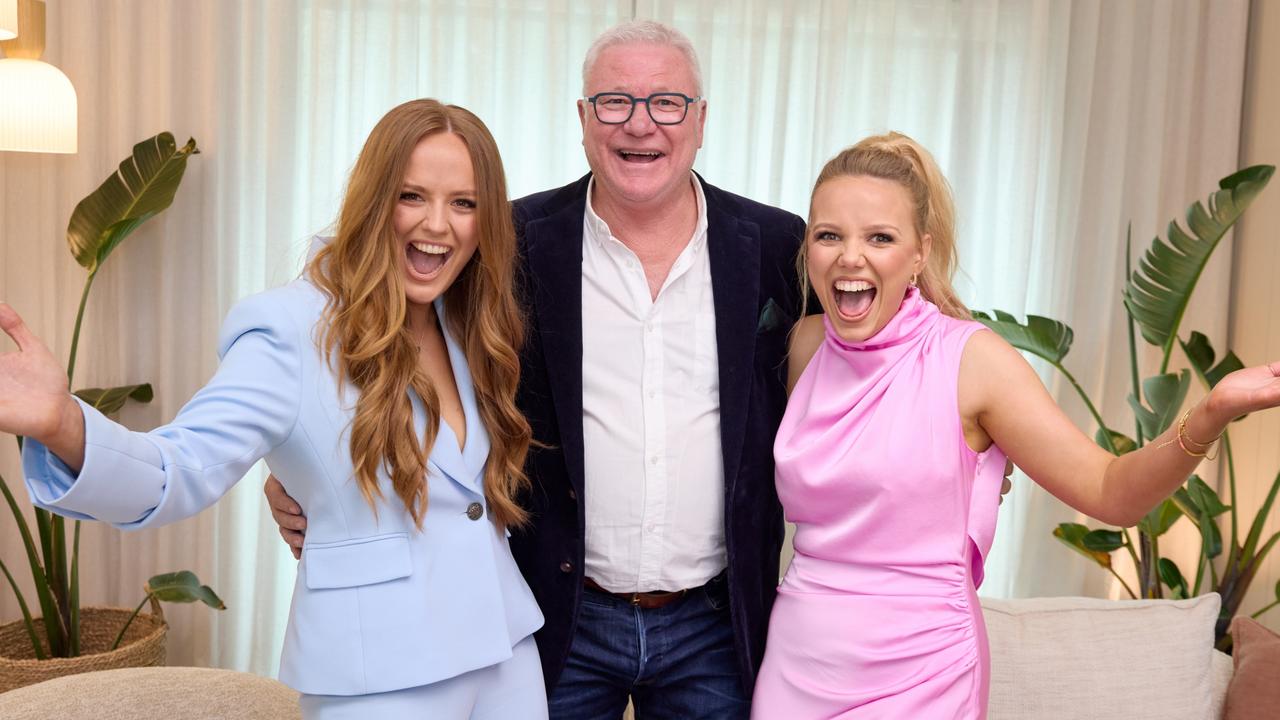Adrian Portelli’s The Block giveaway announces winner
Aussie Billionaire Adrian Portelli’s historic The Block giveaway has left thousands of fans heartbroken.
The nation’s richest-ever giveaway outside Australian lotteries has finally gone off 24 hours after being halted by technical issues.
Aussie billionaire Adrian Portelli’s competition to give away all five properties from the 2024 season of The Block was drawn live in front of 111,000 viewers on Facebook on Friday night.
The original draw, set for Boxing Day, ended a fizzer after the volume of online traffic to Mr Portelli’s company LMCT+ crashed the platform. That left thousands disappointed.
The technical issues prevented the historic draw from going ahead and giving one lucky winner a choice - $8 million in cash or all five properties from The Block 2024 on Phillip Island.
On Friday, the eventual winner was named as 34-year-old Ballarat resident Holly as gold confetti rained down on Mr Portelli and The Block 2024 winners Maddy and Charlotte.
“Oh my God, no f**ing way. I didn’t watch the live on purpose because I thought it would be bad luck,” a stunned Holly told Mr Portelli.
Holly decided to take the night to figure out whether she will take the houses or the cash.
MORE: ‘Won’t be back’: Portelli’s shock Block admission

Glitch brings down giveaway
Mr Portelli was left fumbling on Boxing Day in front of 75,000 Facebook viewers as his team tried to work through the technical issues.
He later issued a statement to fans properly explaining what had happened.
“If you missed last night’s live stream, l made the on-spot decision to delay the announcement of The Block Promotion Giveaway winner by 24 hours due to an issue caused by an increase in traffic which overwhelmed our back-end database,” Mr Portelli said in an email to fans.
“It was all fixed and back online whilst on the live stream, however, I don’t want to rush something of this scale and ensure it is done to the highest of standards.
“Not to worry though - the draw ran to plan and was officially closed at 8pm sharp so nobody extra was able to sneak in, and everyone who entered is locked away ready to go.”
MORE: How Lambo Guy Adrian Portelli swept Block auctions

Mr Portelli launched the giveaway in November following the 2024 season finale of The Block in which he purchased all five properties for a staggering $15 million.
So, what should Holly take: The houses or the cash?
We asked the experts and this is what they had to say.
OPTION 1: Take the homes and sell them
If you decide to take possession of all the houses, but then try to sell them off yourself with the ‘celebrity’ appeal of owning a TV property, you could in theory sell them all for more than the $8m cash prize on offer.
But will buyers be clamouring to get them?
The “glamour” of owning The Block’s Phillip Island homes was questioned by Property Home Base founding director and buyers agent Julie DeBondt-Barker.
“They don’t accurately reflect investment-worthy properties, it’s a constructed reality to serve entertainment,” Ms DeBondt-Barker said.
“There is often-disconnected realities between television narratives and the grounded demands of real estate investment.
“Proper financial planning through trust funds and ensuring the correct ownership structure are essential to managing any tax implications effectively.”
MORE: Secret Block meeting proves finale was ‘rigged’

Eview Real Estate executive and Phillip Island expert Teresa Young said over the years homes on The Block have been criticised for being overpriced.
“Although they showcase impressive designs and modern amenities, their price tags often exceed what many consider reasonable in the current market,” Ms Young said. “Phillip Island is home to countless beautiful beaches, each offering unique experiences – there are numerous tourist attractions, including various pubs that cater to the influx of visitors looking for relaxation and entertainment.
“Considering property purchases of The Block homes, if I were to invest, my approach would involve ensuring the properties are strata-titled — this means dividing the property into separate units which can be sold individually — thus potentially increasing the financial return rather than maintaining it as a single asset.”
Ms Young also said capital gains taxes would also apply to the sale and there likely wouldn’t be a return of $8m on the homes if they were to be sold individually.
“I can’t comment on what they would sell for individually but they likely wouldn’t sell for what they did on The Block,” she said.
OPTION 2: Take the homes and rent them out
If you decided to keep the homes and rent them out would there be a worthwhile return?
According to PropTrack data the median price of a four-bedroom rental home in Cowes is $540 per week.
Using that assumption, in total the properties could fetch, $140,400 a year from rental income.
Industry Insider Property buyers agent Andrew Date said the decision depends on broader economic, legislative, and personal factors.
MORE: Experts slam Portelli: Block is a dud investment

“When advising someone on whether to take the cash or the homes, it really depends on their level of financial literacy and understanding of business, profit, and loss,” Mr Date said.
“The potential to offset tax bills by structuring property ownership through family trusts offers another layer of strategic complexity – structuring property ownership within a family trust can indeed be a more tax-efficient way to avoid hefty land tax bills, by allocating properties to family members.”
Mr Date said the reflection on the broader economic politics encapsulates a reality faced by the potential winner.
“I think if we’re to see the market improve next year it may require a change of government and housing policy, as current policies lead investors to liquidate their assets. Interest rates would also need to decrease successively to boost buyers’ confidence,” he said.
But even if you structure ownership of the properties well, will they make money?
Serial Block bidder Danny Wallis highlighted his concerns about attempting to rent these particular properties out individually.
Mr Wallis previously told The Herald Sun that he hadn’t seen much point in bidding for the homes on the auction day against Mr Portelli.
While he said the homes were good quality, he thought they had clearly been built as holiday homes and were best suited to be listed for short-term rentals.

“I did like the Phillip Island houses, but one of the reasons that I didn’t bid fiercely was there’s too much uncertainty about Airbnbs with the taxes and all that,” he said.
“And if you were to rent them as a holiday home for the whole year, you wouldn’t get a great return. They aren’t really near the beaches.”
“They don’t accurately reflect investment-worthy properties, it’s a constructed reality to serve entertainment,” Ms DeBondt-Barker said.
“There is often-disconnected realities between television narratives and the grounded demands of real estate investment.
“Proper financial planning through trust funds and ensuring the correct ownership structure are essential to managing any tax implications effectively.
“Proper financial planning through trust funds and ensuring the correct ownership structure are essential to managing any tax implications effectively.
OPTION 3: Take the cash
Your Australian Property buyer’s agent Zac Newbold said choosing the cash seemed to align with current economic uncertainties. “In today’s market, where the property prices are predominantly influenced by current trends rather than intrinsic value, the certainty of cash is very attractive,” Mr Newbold said.
“I’d probably take the $8m cash instead of the home – I think this sentiment reflects the growing caution in a market pressured by volatile legislative changes.”
But, for those eyeing the opportunity to harness these properties into a profitable business, particularly through platforms like Airbnb, he has some words of warning.
MORE: ‘S***fight’: Kylie’s big post Block confession

Mr Newbold said that the idea of taking the Phillip Island homes and creating a business was deterred by the Victorian government’s taxes such as the Airbnb tax and land tax.
“Coupled with legislative shifts like a looming 7.5 per cent levy, it doesn’t seem viable to me,” he said.
“One of my clients owns an unencumbered property in Sorrento and is already spending about $80,000 a year on taxes alone.
“Many of my investor clients are now considering buying properties in other states, reflecting a trend towards lower tax burden and better investor climates elsewhere.”
Anyone keen on creating a property portfolio would be better positioned taking the cash and investing in states other than Victoria where the new taxes aren’t an issue.
VERDICT
Eview Real Estate executive’s Teresa Young said it was the best financial decision to take the cash.
“If given the opportunity, I would opt to take the $8m in a context where a significant financial decision needs to be made” Ms Young said.
“The property market has a lot of activity due in part to various financial pressures – there are other homes in Phillip Island where you could make a more sound investment.”
“The residential property market showcases a variety of opportunities.
“There’s a broad selection of homes priced at $600,000 and below, which are appealing to buyers.”

Ms Young said the properties that are sub $600,000 and below can also capture the interest of those looking for an entry-level holiday home.
However, properties in higher price brackets present more selling challenges, as the pool of buyers is smaller and more selective, often requiring more persuasive sales tactics or pricing incentives.
Industry Insider Property buyers agent Andrew Date agreed.
“I’d prefer to take the cash, hedge my bets by putting half into fixed income, and use the other half to purchase a principal place of residence,” Mr Date said.
“This strategy is rooted in the pragmatism of exploiting capital gains tax exemptions, which can carve out substantial financial benefits over time.”
Originally published as Adrian Portelli’s The Block giveaway announces winner




